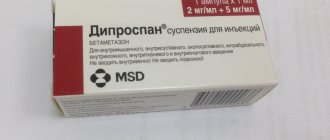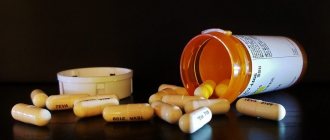Nosological classification (ICD-10)
- A49.3 Mycoplasma infection, unspecified
- A53.9 Syphilis, unspecified
- A54 Gonococcal infection
- A55 Chlamydial lymphogranuloma (venereal)
- A69.2 Lyme disease
- A70 Chlamydia psittaci infection
- A75 Typhus
- H60 Otitis externa
- H66 Suppurative and unspecified otitis media
- H70 Mastoiditis and related conditions
- J01 Acute sinusitis
- J02.9 Acute pharyngitis, unspecified
- J03.9 Acute tonsillitis, unspecified (angina agranulocytic)
- J04 Acute laryngitis and tracheitis
- J06 Acute upper respiratory tract infections of multiple and unspecified localization
- J22 Acute respiratory infection of the lower respiratory tract, unspecified
- J31 Chronic rhinitis, nasopharyngitis and pharyngitis
- J32 Chronic sinusitis
- J35.0 Chronic tonsillitis
- J37 Chronic laryngitis and laryngotracheitis
- K62.8.1* Proctitis
- L08.9 Local infection of skin and subcutaneous tissue, unspecified
- L70 Acne
- M60.0 Infectious myositis
- M65 Synovitis and tenosynovitis
- M65.0 Tendon sheath abscess
- M71.0 Abscess of bursa
- M71.1 Other infectious bursitis
- M86 Osteomyelitis
- N30 Cystitis
- N34 Urethritis and urethral syndrome
- N39.0 Urinary tract infection without established location
- N41 Inflammatory diseases of the prostate gland
- N49 Inflammatory diseases of the male genital organs, not elsewhere classified
- N71 Inflammatory diseases of the uterus, except the cervix
- N73.9 Inflammatory diseases of the female pelvic organs, unspecified
- N74.2 Inflammatory diseases of the female pelvic organs caused by syphilis (A51.4+, A52.7+)
- N74.3 Gonococcal inflammatory diseases of the female pelvic organs (A54.2+)
Pharmacodynamics
Broad-spectrum antibiotic from the tetracycline group. It acts bacteriostatically, suppresses protein synthesis in the microbial cell by interacting with the 30S ribosomal subunit. Active against many gram-positive and gram-negative microorganisms: Streptococcus spp., Treponema spp., Staphylococcus spp., Klebsiella spp., Enterobacter spp. (including E. aerugenes), Neisseria gonorrhoeae, Neisseria meningitidis, Haemophilus influenzae, Chlamydia spp., Mycoplasma spp., Ureaplasma urealyticum, Listeria monocytogenes, Rickettsia spp., Typhus exanthematicus, Escherichia coli, Shigella spp., Campylobacter fetus, Vibrio cholerae, Yersinia spp. (including Yersinia pestis), Brucella spp., Francisella tularensis, Bacillus anthracis, Bartonella bacilliformis, Pasteurella multocida, Borrelia recurrentis, Clostridium spp. (except Clostridium difficile), Actinomyces spp., Fusobacterium fusiforme, Calymmatobacterium granulomatis, Propionibacterium acnes, some protozoa (Entamoeba spp., Plasmodium falciparum).
As a rule, it has no effect on Acinetobacter spp., Proteus spp., Pseudomonas spp., Serratia spp., Providencia spp., Enterococcus spp.
The possibility of acquired resistance to doxycycline in a number of pathogens, which is often cross-linked within a group, should be taken into account (i.e., strains resistant to doxycycline will simultaneously be resistant to the entire group of tetracyclines).
Pharmacokinetics
Suction
Absorption is fast and high (about 100%). Food intake has little effect on the absorption of the drug.
Cmax of doxycycline in blood plasma (2.6–3 μg/ml) is achieved 2 hours after taking 200 mg; after 24 hours, the concentration of the active substance in blood plasma decreases to 1.5 μg/ml.
After taking 200 mg on the first day of treatment and 100 mg/day on subsequent days, the plasma concentration of doxycycline is 1.5–3 mcg/ml.
Distribution
Doxycycline binds reversibly to plasma proteins (80–90%), penetrates well into organs and tissues, poorly into the cerebrospinal fluid (10–20% of plasma levels), however, the concentration of doxycycline in the cerebrospinal fluid increases with inflammation spinal membrane.
Volume of distribution - 1.58 l/kg. 30–45 minutes after oral administration, doxycycline is found in therapeutic concentrations in the liver, kidneys, lungs, spleen, bones, teeth, prostate gland, eye tissue, pleural and ascitic fluids, bile, synovial exudate, exudate of the maxillary and frontal sinuses, in gingival sulcus fluids.
With normal liver function, the level of the drug in bile is 5–10 times higher than in plasma.
In saliva, 5–27% of the concentration of doxycycline in blood plasma is determined.
Doxycycline crosses the placental barrier and is secreted into breast milk in small quantities.
Accumulates in dentin and bone tissue.
Metabolism
A small portion of doxycycline is metabolized.
Removal
T1/2 after a single oral dose is 16-18 hours, after repeated doses - 22-23 hours.
Approximately 40% of the drug taken is excreted by the kidneys and 20–40% is excreted through the intestines in the form of inactive forms (chelates).
Pharmacokinetics in special clinical situations
The half-life of the drug in patients with impaired renal function does not change, because its excretion through the intestines increases.
Hemodialysis and peritoneal dialysis do not affect the concentration of doxycycline in blood plasma.
The dangers of combining antibiotics and alcohol
The instructions clearly state that alcohol is incompatible with Unidox Solutab (this applies even to cases where the drug was prescribed for the treatment of acne). The ban applies to all types of alcoholic beverages without exception. The combination of an antibiotic with alcohol causes the most unpredictable consequences, including:
- decreased effectiveness of treatment;
- increased toxic effects on the liver, kidneys, stomach, esophagus;
- risk of developing allergies.
Lack of compatibility and negative consequences are associated primarily with their toxic effect on the body. In this case, we are talking about their effect on the tissues of the digestive and excretory systems, and the liver.
Alcohol strongly poisons the body, causing the development of pathological processes in all tissues and organs, inhibiting the action of the immune system. Namely, the state of the immune system determines how quickly the body copes with the disease. In addition, alcohol negatively affects the liver and kidneys, which can lead to severe intoxication of the body. This is explained by the fact that the liver is responsible for neutralizing poisons that enter the body, including alcoholic toxins, and the kidneys remove them.
As for Unidox Solutab, it has a toxic effect on the liver and kidneys, since the active substance of the drug is concentrated in these organs in considerable quantities. Because of this, antibiotics are not prescribed to patients with serious damage to these organs.
The combination of Unidox Solutab and alcohol doubles the load on the liver and kidneys, which makes it difficult for them to recover when treatment is completed.
This can lead to the development of toxic hepatitis, kidney failure or other serious illness, which requires urgent hospitalization. In addition, drinking alcohol during treatment with tetracycline antibiotics can cause severe stomach upset, which will be accompanied by vomiting, diarrhea, dizziness, and abdominal pain.
Indications of the drug Unidox Solutab®
Infectious and inflammatory diseases caused by microorganisms sensitive to the drug:
respiratory tract infections, incl. pharyngitis, acute bronchitis, exacerbation of COPD, tracheitis, bronchopneumonia, lobar pneumonia, community-acquired pneumonia, lung abscess, pleural empyema;
infections of ENT organs, incl. otitis media, sinusitis, tonsillitis;
infections of the genitourinary system (cystitis, pyelonephritis, bacterial prostatitis, urethritis, urethrocystitis, urogenital mycoplasmosis, acute orchiepididymitis; endometritis, endocervicitis and salpingoophoritis as part of combination therapy), incl. sexually transmitted infections (urogenital chlamydia, syphilis in patients with penicillin intolerance, uncomplicated gonorrhea (as an alternative therapy), granuloma inguinale, lymphogranuloma venereum);
infections of the gastrointestinal tract and biliary tract (cholera, yersiniosis, cholecystitis, cholangitis, gastroenterocolitis, bacillary and amoebic dysentery, travelers' diarrhea);
infections of the skin and soft tissues (including wound infections after animal bites), severe acne (as part of combination therapy);
other diseases (yaws, legionellosis, chlamydia of various localizations (including prostatitis and proctitis), rickettsiosis, Q fever, Rocky Mountain spotted fever, typhus (including typhus, tick-borne relapsing), Lyme disease (I stage. - erythema migrans), tularemia, plague, actinomycosis, malaria; infectious diseases of the eyes (as part of combination therapy - trachoma); leptospirosis, psittacosis, ornithosis, anthrax (including pulmonary form), bartonellosis, granulocytic ehrlichiosis; whooping cough, brucellosis, osteomyelitis; sepsis, subacute septic endocarditis, peritonitis);
prevention of postoperative purulent complications;
prevention of malaria caused by Plasmodium falciparum during short-term travel (less than 4 months) to areas where strains resistant to chloroquine and/or pyrimethamine-sulfadoxine are common.
When is it prescribed?
Unidox Solutab, the instructions indicate this, is prescribed for the treatment of various infectious and inflammatory diseases that are provoked by drug-sensitive pathogenic microorganisms.
A wide range of applications makes it possible to successfully treat diseases of the respiratory system and ENT organs. Indications for prescribing the medicine are infectious diseases of the genitourinary system and gastrointestinal tract. The effectiveness of Unidox Solutab 100 has been proven in the treatment of skin pathologies and in the prevention of purulent complications after operations.
A detailed explanation of the indications for the tetracycline antibiotic is contained in the instructions for use. It is the basis for prescribing the drug.
Side effects
From the gastrointestinal tract: anorexia, nausea, vomiting, dysphagia, diarrhea; enterocolitis, pseudomembranous colitis.
Dermatological and allergic reactions: urticaria, photosensitivity, angioedema, anaphylactic reactions, exacerbation of systemic lupus erythematosus, maculopapular and erythematous rash, pericarditis, exfoliative dermatitis.
From the liver: liver damage during long-term use or in patients with renal or hepatic insufficiency.
From the kidneys: an increase in residual urea nitrogen (due to the anti-anabolic effect).
From the hematopoietic system: hemolytic anemia, thrombocytopenia, neutropenia, eosinophilia, decreased prothrombin activity.
From the nervous system: benign increase in intracranial pressure (anorexia, vomiting, headache, papilledema), vestibular disorders (dizziness or instability).
On the thyroid gland: in patients receiving doxycycline for a long time, reversible dark brown discoloration of the thyroid tissue is possible.
From the side of teeth and bones: doxycycline slows down osteogenesis, disrupts the normal development of teeth in children (the color of teeth irreversibly changes, enamel hypoplasia develops).
Other: candidiasis (stomatitis, glossitis, proctitis, vaginitis) as a manifestation of superinfection.
How long before you are allowed to drink alcohol?
The course of treatment with Unidox Solutab lasts about five to ten days. The medicine is prescribed to be taken once or twice a day with meals to avoid the possibility of developing an esophageal ulcer or damage to its mucous membrane.
If the tablet is taken once, the active substance is eliminated from the body within sixteen to eighteen hours. After taking repeated doses, it will take a day for the medication to come off. Therefore, you should not think that if the pill was taken in the morning, you can relax in the evening and drink a glass of beer or a little wine. As long as the active substance of the drug circulates in the blood, due to lack of compatibility, the body’s reaction is unpredictable.
The course of antibiotic treatment cannot be interrupted; it usually lasts from five to ten days. But there are diseases (for example, syphilis) when the medicine needs to be taken for about a month, twice a day. If you drink alcohol during treatment, the therapy will be ineffective and the disease will continue to develop.
Since treatment in many cases takes place at home, the patient himself must monitor his diet and be aware of the dangers of non-compliance with the doctor’s instructions, including drinking alcohol. Therefore, no holidays or other events should confuse him and force him to decide to drink alcohol.
It is necessary to remember: alcohol can be taken no earlier than treatment with medications has been completed (this applies not only to Unidox Solutab), but also to other medications that were used during therapy. You can drink alcohol only a week after completing the course of treatment. In some cases, especially if recovery is delayed, the body needs more time to restore the liver, kidneys, and also the organ that was attacked by bacteria . Therefore, it is better to check with your doctor about when you can drink alcohol after treatment with Unidox Solutab.
Interaction
Antacids containing aluminum, magnesium, calcium, iron preparations, sodium bicarbonate, magnesium-containing laxatives reduce the absorption of doxycycline, so their use should be separated by an interval of 3 hours.
Due to the suppression of intestinal microflora by doxycycline, the prothrombin index decreases, which requires dose adjustment of indirect anticoagulants.
When doxycycline is combined with bactericidal antibiotics that interfere with cell wall synthesis (penicillins, cephalosporins), the effectiveness of the latter is reduced.
Doxycycline reduces the reliability of contraception and increases the frequency of acyclic bleeding when taking estrogen-containing hormonal contraceptives.
Ethanol, barbiturates, rifampicin, carbamazepine, phenytoin and other stimulants of microsomal oxidation, accelerating the metabolism of doxycycline, reduce its concentration in the blood plasma.
The simultaneous use of doxycycline and retinol increases intracranial pressure.
Directions for use and doses
Inside, during meals, the tablet can be swallowed whole, divided into parts or chewed, washed down with a glass of water, or diluted in a small amount of water (about 20 ml).
Typically the duration of treatment is 5–10 days.
Adults and children over 8 years of age weighing more than 50 kg - 200 mg in 1-2 doses on the first day of treatment, then 100 mg daily. In cases of severe infections - at a dose of 200 mg daily throughout treatment.
For children 8–12 years old weighing less than 50 kg, the average daily dose is 4 mg/kg on the first day, then 2 mg/kg per day (in 1–2 doses). In cases of severe infections - at a dose of 4 mg/kg daily throughout treatment.
Features of dosing for certain diseases
For infection caused by S.pyogenes, Unidox Solutab ® is taken for at least 10 days.
For uncomplicated gonorrhea (except for anorectal infections in men): adults - 100 mg 2 times a day until complete cure (on average within 7 days), or 600 mg - 300 mg in 2 doses are prescribed for one day (second taken 1 hour after the first).
For primary syphilis - 100 mg 2 times a day for 14 days, for secondary syphilis - 100 mg 2 times a day for 28 days.
For uncomplicated urogenital infections caused by Chlamydia trachomatis, cervicitis, non-gonococcal urethritis caused by Ureaplasma urealyticum - 100 mg 2 times a day for 7 days.
For acne - 100 mg/day; course of treatment - 6–12 weeks.
Malaria (prevention) - 100 mg 1 time per day 1–2 days before the trip, then daily during the trip and for 4 weeks after returning; children over 8 years old - 2 mg/kg 1 time per day.
Travelers' diarrhea (prevention) - 200 mg on the first day of the trip in 1 or 2 doses, then 100 mg 1 time per day during the entire stay in the region (no more than 3 weeks).
Treatment of leptospirosis - 100 mg orally 2 times a day for 7 days; prevention of leptospirosis - 200 mg once a week during your stay in a disadvantaged area and 200 mg at the end of the trip.
To prevent infections during medical abortion - 100 mg 1 hour before and 200 mg after the intervention.
Maximum daily doses for adults are up to 300 mg/day or up to 600 mg/day for 5 days for severe gonococcal infections. For children over 8 years old weighing more than 50 kg - up to 200 mg, for children 8-12 years old weighing less than 50 kg - 4 mg/kg daily throughout treatment.
In the presence of renal (Cl creatinine <60 ml/min) and/or liver failure, a reduction in the daily dose of doxycycline is required, since it gradually accumulates in the body (risk of hepatotoxicity).
Unidox Solutab price, where to buy
The average price of tablets in Russia is about 300 rubles. per pack 10 pcs.
- Online pharmacies in RussiaRussia
- Online pharmacies in UkraineUkraine
- Online pharmacies in KazakhstanKazakhstan
ZdravCity
- Unidox Solutab dispersible tablets 100 mg 10 pcs. ZiO-Zdorovye ZAO
300 rub. order - Unidox solutab dispersant tablets. 100 mg 20 pcs. ZiO-Zdorovye ZAO
RUR 591 order
Pharmacy Dialogue
- Unidox Solutab (table dispersant 100 mg No. 10) ZiO-Zdorovye CJSC/Astellas Pharma Europe B.V.
RUB 332 order
- Unidox Solutab (table dispersant 100 mg No. 20)Astellas Pharma/ZiO-Zdorovye CJSC
RUR 607 order
- Unidox Solutab (table dispersant 100 mg No. 20)Astellas Pharma/ZiO-Zdorovye CJSC
RUR 597 order
- Unidox Solutab (table dispersant 100 mg No. 10) ZiO-Zdorovye CJSC/Astellas Pharma Europe B.V.
RUB 327 order
show more
Pharmacy24
- Unidox Solutab 100 mg N10 tablets Astellas Pharma Europe B.V., Netherlands
141 UAH.order
PaniPharmacy
- Unidox solutab tablets Unidox salutab tablets. 100 mg No. 10 Netherlands, Astellas Pharma Europe
152 UAH order
show more
special instructions
There is a possibility of cross-resistance and hypersensitivity to other tetracycline drugs.
Tetracyclines may increase PT; use of tetracyclines in patients with coagulopathies should be carefully monitored.
The anti-anabolic effect of tetracyclines can lead to an increase in the level of residual urea nitrogen in the blood. As a rule, this is not significant for patients with normal renal function. However, in patients with renal failure, an increase in azotemia may occur. The use of tetracyclines in patients with impaired renal function requires medical supervision.
With long-term use of the drug, periodic monitoring of laboratory blood parameters, liver and kidney function is required.
Due to the possible development of photodermatitis, it is necessary to limit exposure to insolation during treatment and for 4–5 days after it.
Long-term use of the drug can cause dysbacteriosis and, as a result, the development of hypovitaminosis (especially B vitamins).
To prevent dyspeptic symptoms, it is recommended to take the drug with meals.
The specific effects on the ability to drive a car and operate machinery have not been studied.
What are the contraindications?
The main contraindication is hypersensitivity to tetracyclines and other components of the drug. It is prohibited to carry out drug therapy during the entire period of pregnancy. The greatest risks of developing pathologies in the fetus occur in the 1st trimester, when the placenta has not yet formed. The active substance can accumulate in bone tissue, which will disrupt mineralization processes and lead to unpredictable consequences.
For the treatment of children under 8 years of age, Unidox Solutab tablets, the instructions for use confirm this, are not prescribed. They should be abandoned if there are serious problems with the liver and kidneys. They are not prescribed for the diagnosis of porphyria. This pathology is hereditary, it is characterized by disorders of pigment metabolism and other pathological symptoms.



